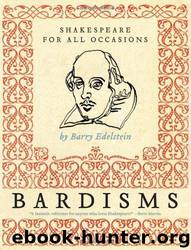Bardisms by Barry Edelstein

Author:Barry Edelstein
Language: eng
Format: mobi, epub
Tags: 1564-1616, , William - Quotations, Reference, Dictionaries of quotations, Gift books, William, Literary Criticism, Shakespeare, Quotations
ISBN: 9780061493515
Publisher: Harper
Published: 2009-10-15T07:00:00+00:00
SHAKESPEARE ON SOLDIERS
To th’ wars, my boy, to th’ wars!
—PAROLLES, All’s Well That Ends Well, 2.3.262
Most of Shakespeare’s soldiers are cut from cloth different from the one Jaques talks about. Their cloth is not buffoonish, but is instead distinctly crimson in hue. In Henry V, for example, soldiers “nothing do but meditate on blood.” In Richard II, they open “the purple testament of bleeding war.” In Macbeth, their weapons have “smoked with bloody execution.” Usually, when Shakespeare thinks soldier, he writes violence, blood, and death.
Usually, but not always. Sprinkled throughout the canon are a small number of speeches that portray a third kind of soldier, a man who is neither a foolish braggart nor a killing machine. These speeches frame a figure of upstanding morals, dashing countenance, refined carriage, abundant bravery, and consummate charm. Shakespeare’s model soldiers represent the best of the European aristocratic military tradition. They are exemplars of that tradition’s highest values, which are summed up in a famous volume scholars know Shakespeare read: Baldassare Castiglione’s Renaissance classic, The Book of the Courtier.
Castiglione was an eminent Italian diplomat who began his career in the court of the Duke of Urbino, a scintillating place of unparalleled cultural, artistic, and intellectual sophistication. The Book of the Courtier distills the essence of Urbino’s charms, and spells out the qualities that make it the ideal Renaissance court. Chief among them is the presence of countless Renaissance gentlemen, perfect specimens who are, in short, everything you’d want your son to grow up to be. Their defining attribute, the most important ingredient of the ideal chivalric life, is something called in Italian sprezzatura. The word is almost impossible to render in English, except by making reference to the defining characteristics of the Count of Monte Cristo, or James Bond, or, ironically, Shakespeare’s own perfect soldiers. Sprezzatura has to do with effortlessness, ease in all situations, the ability to make even the most arduous task seem casual, and a knack for seeming to do the most challenging things without devoting to them any preparation or even a moment’s thought. Shakespeare’s soldiers have sprezzatura to spare, and when you have occasion to talk about anyone in the service, you can turn to them for the words you’ll need.
Download
This site does not store any files on its server. We only index and link to content provided by other sites. Please contact the content providers to delete copyright contents if any and email us, we'll remove relevant links or contents immediately.
4 3 2 1: A Novel by Paul Auster(11079)
The handmaid's tale by Margaret Atwood(6881)
Giovanni's Room by James Baldwin(5900)
Big Magic: Creative Living Beyond Fear by Elizabeth Gilbert(4741)
Asking the Right Questions: A Guide to Critical Thinking by M. Neil Browne & Stuart M. Keeley(4608)
On Writing A Memoir of the Craft by Stephen King(4230)
Ego Is the Enemy by Ryan Holiday(4008)
Ken Follett - World without end by Ken Follett(3984)
The Body: A Guide for Occupants by Bill Bryson(3831)
Bluets by Maggie Nelson(3730)
Adulting by Kelly Williams Brown(3687)
Guilty Pleasures by Laurell K Hamilton(3604)
Eat That Frog! by Brian Tracy(3532)
White Noise - A Novel by Don DeLillo(3446)
The Poetry of Pablo Neruda by Pablo Neruda(3375)
Alive: The Story of the Andes Survivors by Piers Paul Read(3325)
The Book of Joy by Dalai Lama(3242)
The Bookshop by Penelope Fitzgerald(3241)
Fingerprints of the Gods by Graham Hancock(3230)
